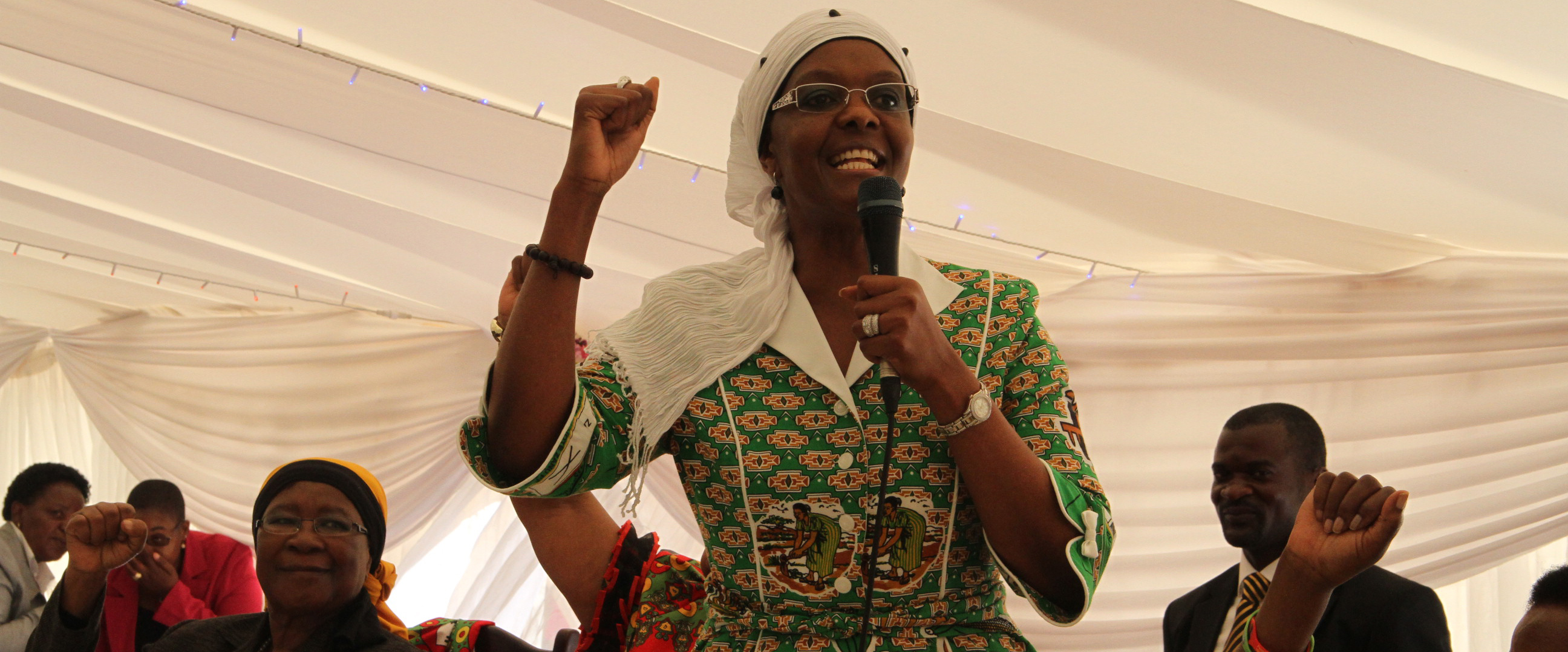
The Sunday Mail

Friday’s recommendation by Zanu-PF’s Women’s League that First Lady Amai Grace Mugabe be appointed their Secretary at the party Congress in December lays the foundation for what could be intriguing political contests.
Incumbent Women’s League Secretary Cde Oppah Muchinguri is at the forefront of campaigning for Amai Mugabe, with party insiders indicating this means she is likely eyeing higher office herself.
However, this does not mean Amai Mugabe has the post bagged, though observers say with the groundswell of support the appointment may as well be a formality come December.
Information gathered by The Sunday Mail indicates Cde Muchinguri might challenge for the post of Secretary for Administration – just a rung beneath the Presidium – currently held by Cde Didymus Mutasa.
This could see Cde Mutasa either standing his ground, or alternatively also looking to go for the National Chair or Vice Presidency.
Cde Muchinguri could not be reached for comment on Saturday as a lady who answered her phone said she was locked up in meetings.
Yesterday, some media houses insinuated Vice President Joice Mujuru might be displeased with the developments because she did not attend the highly-subscribed meeting at Amai Grace Mugabe Children’s Home in Mazowe on Friday.
However, Presidential spokesperson Mr George Charamba said this demonstrated poor understanding of Zanu-PF’s structures.
“She had no reason to be there, she is in the Presidium and this was a meeting about an organ of the party – she is senior to that organ. These conspiracy theorists should also ask why President Mugabe did not attend: he had no business there, same as his Vice President,” Mr Charamba said.
Party insiders said Friday’s developments pointed to different approaches within the party on how cadres can ascend in the hierarchy and could signal a redefinition of the parameters.
One view is that a strictly linear system based on the party’s constitution should be used, with leaders systematically rising through the ranks.
The other view is that while the constitution is important, so are the values that inform it and as such leaders can emerge as a result of direct election to any post.
On several occasions this year, senior officials like Cde Mutasa and National Chair Cde Simon Khaya Moyo have said the hierarchy was constitutionally established and should be respected.
Then on Friday Cde Muchinguri said, “President Mugabe did not impose himself, people voted for him. We do not want people who impose themselves… everyone must be subjected to the electoral test.”
A Politburo member told this paper that those supporting the linear route said this “guaranteed order and stability” while the other group said “values and principles that inform the order are more important”.
“Historically, the revolutionary party has tended to work on a mix of the two views, though on at least two pivotal instances the linear approach has been made subservient to legalistic-bureaucratic considerations.
“The first was the Mgagao (Tanzania) Declaration of October 1975 by military officers, which technically subverted the political structure by ousting the leadership of Bishop Abel Muzorewa, Reverend Ndabaningi Sithole and Cde James Chikerema from the helm of the unified ANC, and paved the way for Cde Robert Mugabe’s ascension to the apex of liberation politics.
“The second was the 2004 leapfrogging of several people in Zanu-PF’s hierarchy by Cde Mujuru to become party Second Secretary and Vice President,” the Politburo member said.
Prior to that in 2002, then Zimbabwe Defence Forces Commander, General Vitalis Zvinavashe also appeared to indicate a preference for the values-principles system over a purely linear succession when he said: “We wish to make it very clear to all Zimbabwean citizens that the security organisations will only stand in support of those political leaders that will pursue Zimbabwean values, traditions and beliefs for which thousands of lives were lost, in pursuit of Zimbabwe’s hard-won Independence, sovereignty, territorial integrity and national interests.
“To this end, let it be known that the highest office in the land is a straitjacket whose occupant is expected to observe the objectives of the liberation struggle. We will, therefore, not accept, let alone support or salute, anyone with a different agenda that threatens the very existence of our sovereignty, our country and our people.”
Indications are that these competing considerations are likely to shape how next month’s Women’s and Youth leagues pre-National Congress meetings pan out.
Traditionally, these two organs have been instrumental in shaping the agenda and in 2004 it was the Women’s League that formally propelled Cde Mujuru to the Vice Presidency.
A Zanu-PF Central Committee member said apart from the political intrigues surrounding Friday’s recommendation, there were practical considerations at play.
Late First Lady Amai Sally Mugabe was a key figure in the Women’s League, appointed its Deputy Secretary in 1978 and then Secretary in 1989.
“Amai Grace Mugabe’s ascension to that post will re-gravitate the Women’s League to practical people-centered programming as she has been very active in the fields of social welfare and development, much like our national heroine Amai Sally Mugabe.
“This could see the Women’s League becoming more than just a mass mobilisation organ and more of an instrument for actual national development,” she said.
By Mabasa Sasa (Acting Editor)







